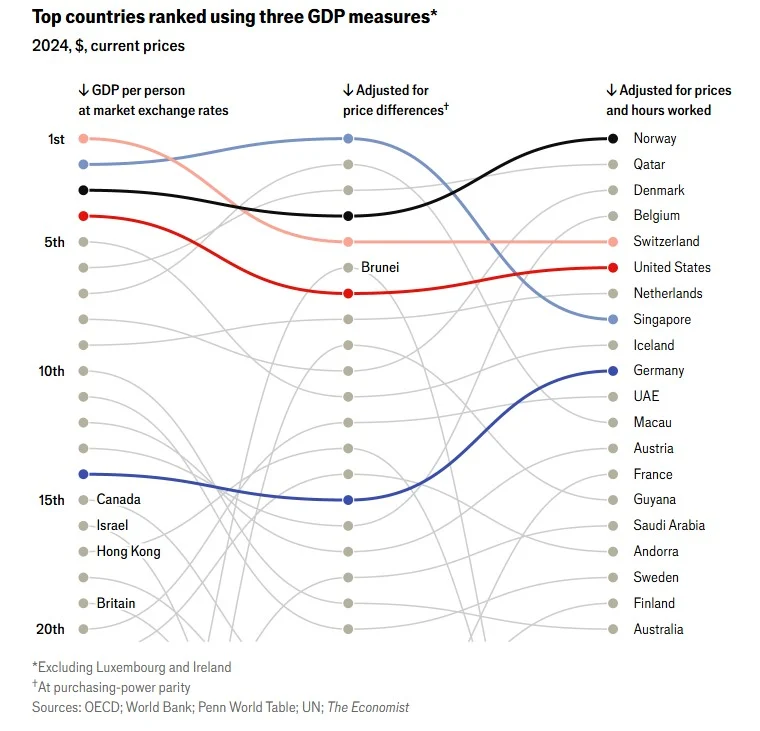Filenews 20 July 2025
The question "which country is the richest in the world" as strange as it may seem, does not have a single answer. It depends on which criterion you set.
How much money the average citizen makes does not tell the full truth, because prices vary from country to country. A modest salary can provide a much higher standard of living in a cheap country than in an expensive one.
Working hours also play a role: there are countries that achieve high incomes with less work and more free time.
With this in mind, the Economist ranked 178 countries using three different criteria:
- GDP per capita at current prices (in dollars). This is the simplest and most popular measure.
- GDP per capita in terms of purchasing power (PPP), which takes into account local prices.
- GDP per capita adjusted for working hours, which incorporates both local prices and how much citizens work.
Who is at the top
The three states that dominate overall are Switzerland, Singapore, and Norway.
In absolute numbers (current prices), Switzerland is first, with an average income of over $100,000 in 2024. It is followed by Singapore with $90,700 and Norway with $86,800.
After adjusting for local prices, Singapore rises to the top as it is cheaper than Switzerland.
After adjusting for working hours, Norway comes first, as last year, followed by Qatar and Denmark.
The United States, the world's largest economy, ranks 4th, 7th, and 6th, respectively. Britain is much lower: 19th, 27th and 25th.

What do the divergences show?
The position of each country, depending on the criterion, also shows its social peculiarities. In countries where few women work, such as Saudi Arabia and Turkey, hourly income seems higher because it is concentrated in fewer people.
On the contrary, in countries with very young or very old populations, such as Nigeria and Italy, the small labour base supports a large part of the population.
The big winner and the big loser
Guyana is the fastest-growing country this year, gaining 17 places on average, thanks to the oil boom that increased incomes by 40% in just one year.
At the bottom of the ranking is Burundi, where more than half of the population is under the age of 17 and the per capita income corresponds to 0.15% of the Swiss one.
Even after adjusting for the cost of living, a Swiss makes as much as 100 Burundian citizens.
Excluded from the ranking are very small or peculiar states, such as Ireland (due to the artificial inflating of GDP by multinationals), Luxembourg (due to cross-border workers) and islands such as Bermuda.
The system does not take into account the distribution of wealth, nor the value of assets. In some countries, official data are incomplete or disputed.
No measurement alone can fully capture prosperity. However, the combined indicators offer a valuable guide to where in the world wealth is accompanied by quality of life.
